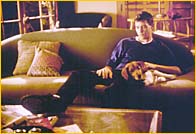
![]()
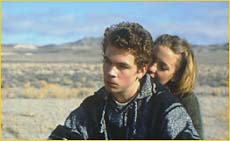 Brendon Sexton III and Kate Hudson in Desert Blue. |

by Susan Royal
The South by Southwest conference (SXSW) began thirteen years ago as a music festival - a natural outgrowth of the thriving music community in Austin, Texas. Eight years later it expanded to include film and interactive media, making it a comprehensive industry event of festivals, panel discussions, mentoring sessions and a trade show.
This year's edition opened with the U.S. premiere of director Morgan J. Freeman's Desert Blue, starring Christina Ricci, Casey Affleck, Sara Gilbert, Kate Hudson and the two stars of Freeman's 1997 Sundance Audience Award-winning Hurricane Streets: Brendon Sexton III and Isidra Vega. The ensemble culture clash comedy concerns a young Hollywood soap star quarantined in the remote desert town of Baxter (population: 89) - home of a giant pink ice cream cone roadside attraction.
Freeman said his inspiration for the film came when he was a student directing a documentary in small desert towns in California and Nevada. He was intrigued by some of the real life inhabitants. "One guy wanted to take me back to his place and show me where he gave Spielberg the idea for ET. I thought it would be fun to let a movie unfold in one of these small towns full of strange characters." (The Samuel Goldwyn film will be released June 18.)
|
|
$pent is the fourth film Glickman has premiered at SXSW, the earlier films being Full Tilt Boogie, Real Stories of the Donut Men and God Said "HA!" Glickman explains why she keeps coming back: "It's like the relationship you have with the hospital where they delivered your first baby. It's that kind of trust."
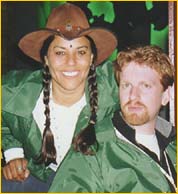 Producer Rana Joy Glickman and director Gil Cates, Jr. in their green $pent jackets. |
Another panelist, Meredith Scott Lynn, who produced and co-directed another film at SXSW - Standing on Fishes - had this observation:
"South by Southwest has more upbeat films than any other festival I've been to. I hear lots of laughter in the theaters and I love that. I'm so bored with the angsty, troubled artist."
Scott Lynn and Glickman, friends who once worked together on I Love You, Don't Touch Me, created the highest profiles for their respective films at SXSW this year. The green $pent jackets and caps could be spotted everywhere, though Glickman cheerfully conceded that Scott Lynn's fisherman hats (for Standing on Fishes) topped her baseball caps.
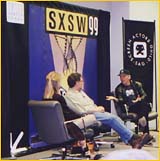 Mary Stuart Masterson, Richard Masur and Billy Bob Thornton. |
"Nobody told Picasso, 'Hey, you may want to straighten out those eyes.' Nobody took his painting around to different cities and asked people who work at Walmart how to change it. And I'm not knocking people who work at Walmart: They're my people."
Thornton, who has worked on low budget independent films as well as mega-budget studio pictures noted a way to know which kind of film you're doing. "On an independent film someone might say to you, 'I saw the dailies from yesterday and man, you really nailed it.' But on a studio picture they say, 'I saw the dailies from yesterday and man, that NASA sign behind your head really looked great.'"
 Jena Malone and Mary Stuart Masterson in The Book oof Stars. |
Billed as "A Conversation With..." the panel had no particular topic and the discussion drifted to the actor's relationship to the director. Masterson said she didn't need a director to have all the answers, but to just create a safe environment where an actor isn't afraid to try something and fail. She said, "A lot of directors don't know what we [the actors] are doing and they're afraid of us." Richard Masur, president of SAG, commented on the type of director who doesn't give the actor room to create: "I guess it's easier to drive a car than to ride a horse."
When asked if he thought a director should take an acting lesson to learn more about the actor's process, Thornton replied,
"I'd recommend directors get a regular job first. Most come straight out of film school. I meet very few directors who have poured concrete. Where are they going to learn about human behavior? From watching TV and movies? Get a job - or at least take a trip."
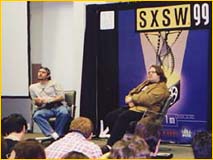 Robert Rodriguez and Guillermo Del Toro |
He and Del Toro jovially debated the merits of film versus digital formats. Rodriguez asserted:
"The film format has become archaic: all those giant rolls and the color correction. And as soon as you watch a print it gets scratched. It's like the Dark Ages."
And Del Toro defended it. "Maybe it's because I come from an animistic culture and I'm superstitious, but I just like the feel of it. I like the grain. With digital everything is too sharp." Rodriguez responded, "That is total bullshit. I've been to your house and all you've got are laser disks and DVDs," to which Del Toro cracked up laughing.
All SXSW logos and artwork are © 1996, 1997, 2000 SXSW, Inc.
![]()
Inside Film Home | News & Views | Film Fests by Month
Screenwriting | Past Articles
All Inside Film logos, artwork, stories, information and photos are
© 1997-2020 Inside Film Magazine. All rights reserved.
Do not duplicate or distribute in any form. All other logos,
artwork and photos are © their individual owners.
